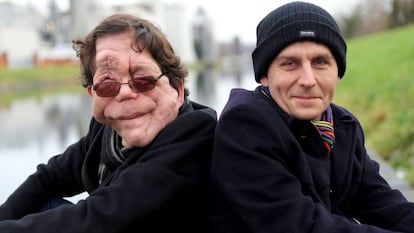The Spanish scientist working on a cure for a rare disfiguring disease
Biochemist Héctor Peinado has received €500,000 from the US government to study neurofibromatosis-1

Eight years after leaving Spain, biochemist Héctor Peinado has just been awarded a €500,000 grant to research a rare and still largely unknown disease: neurofibromatosis-1, mistakenly associated in the public imagination with Joseph Merrick, the so-called Elephant Man made famous in David Lynch’s 1980 film of the same name, but who actually suffered from the Proteus Syndrome.
Peinado, a 40-year-old native of Madrid, developed his expertise in neurofibromatosis-1 at the Weill Cornell Medical University in New York, where he worked on stopping metastasis, the process by which cancerous cells spread to other organs. Metastasis is responsible for 90% of the eight million cancer deaths each year in the world.
Peinado’s team has discovered a protein that communicates with the malign tumor and the rest of the body
Peinado and his team discovered that primary tumors emit millions of tiny vesicles called exosomes, which act as advance units that prepare a cancer’s invasion of the rest of the body. Peinado discovered that these units carried a “kind of postal code” that led them to a specific organ, such as the pancreas or the lungs.
Last year, Peinado returned to Madrid to continue his research at Spain’s CNIO National Center for Cancer Research. The US Defense Department doesn’t normally hand out €500,000 to non-US scientists, but Peinado’s is a special case. Neurofibramatosis-1 is a hereditary disease that affects one in 3,000 births. It is initially indicated by the appearance of coffee-colored patches on the skin, along with tumors called neurofibromas on nervous tissue. As yet there is no treatment.

“We’re not talking about a tumor, but up to 500 tumors, which, although they are benign, affect the central nervous system and can create problems with mobility or awareness,” explains Peinado. Two-thirds of people with the disease avoid major complications most of their lives, but are at risk. Sometimes, huge tumors appear under the skin that can deform the face, such as in the case of British actor Adam Pearson, who appears alongside Scarlett Johansson in the 2013 film Under the Skin.
It is impossible to predict how the disease will develop. Pearson’s twin brother Neil, who also has neurofibromatosis, has completely different symptoms. They have just made a documentary for the BBC telling the story of their fight to prevent the disease from overcoming their lives. Benign tumors transform into malignant cancers in around 5% of cases, and can lead to death.
The US Defense Department doesn’t normally hand out €500,000 to non-US scientists
Peinado’s team has discovered a protein that strengthens communication between the malign tumor and the rest of the body. “The tumor uses this to help its own growth. Our job is to find a way to cut those lines of communication so as to reduce the metastasis,” he explains. So far, he and his team have managed to reduce primary tumors and metastasis by around 70%, blocking the protein in rats with a drug that has already been clinically tested in humans for other types of cancer.
“This disease is benign until the moment it starts transforming and the tumors become malignant. And once metastasis starts, the chances of survival decline. After five years, a high percentage of patients die,” says Peinado. The US Defense Department says that his work “could lead to a new therapy.”
English version by Nick Lyne.
Tu suscripción se está usando en otro dispositivo
¿Quieres añadir otro usuario a tu suscripción?
Si continúas leyendo en este dispositivo, no se podrá leer en el otro.
FlechaTu suscripción se está usando en otro dispositivo y solo puedes acceder a EL PAÍS desde un dispositivo a la vez.
Si quieres compartir tu cuenta, cambia tu suscripción a la modalidad Premium, así podrás añadir otro usuario. Cada uno accederá con su propia cuenta de email, lo que os permitirá personalizar vuestra experiencia en EL PAÍS.
¿Tienes una suscripción de empresa? Accede aquí para contratar más cuentas.
En el caso de no saber quién está usando tu cuenta, te recomendamos cambiar tu contraseña aquí.
Si decides continuar compartiendo tu cuenta, este mensaje se mostrará en tu dispositivo y en el de la otra persona que está usando tu cuenta de forma indefinida, afectando a tu experiencia de lectura. Puedes consultar aquí los términos y condiciones de la suscripción digital.









































